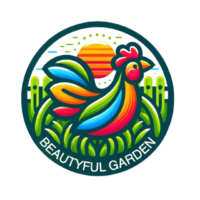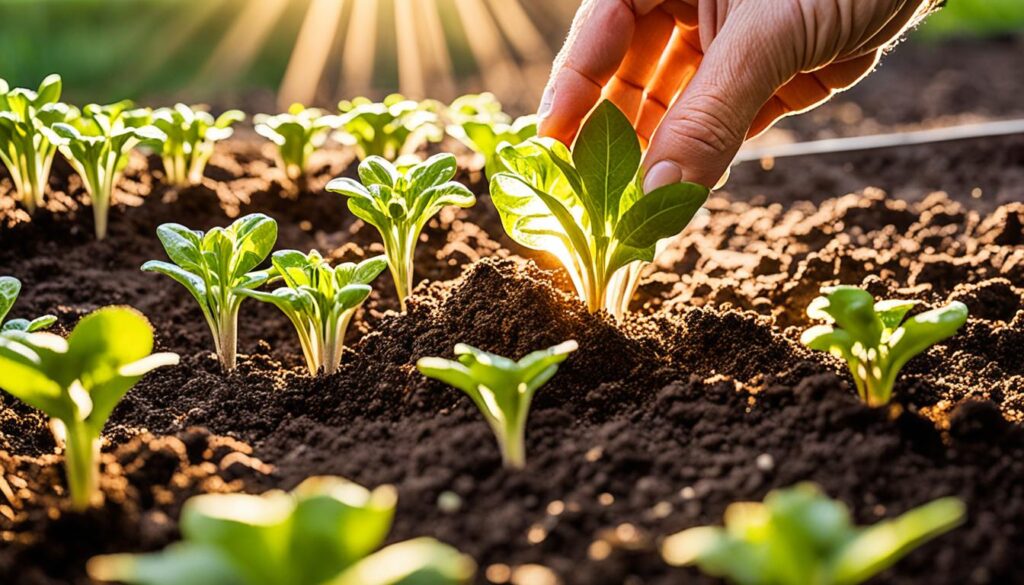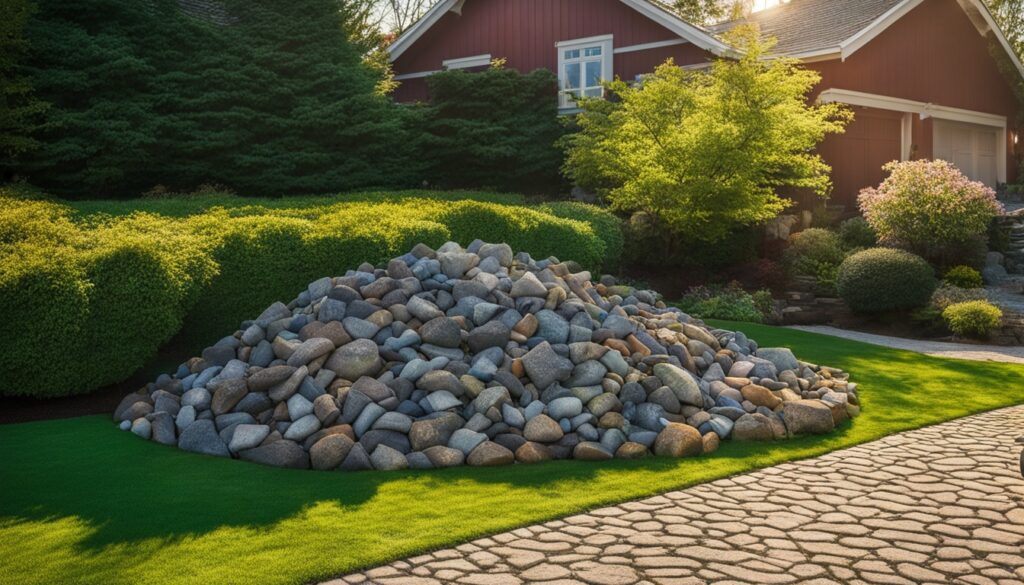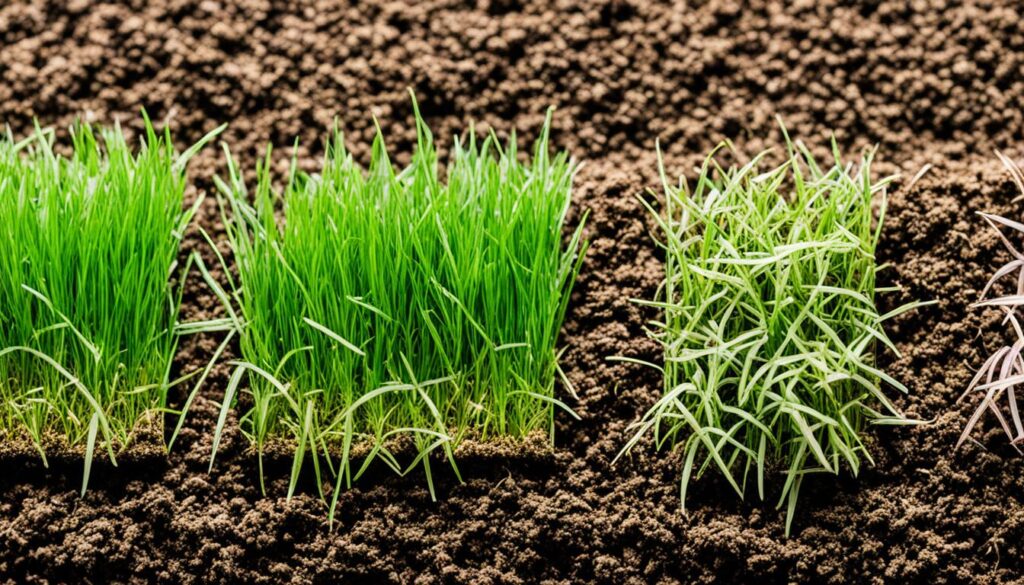It can take up to three months for some seeds to grow in a garden. Asparagus crowns may take up to three years to produce food. Gardening has taught me a lot about patience, resilience, and growing as a person. By planting seeds and watching them grow, I’ve learned to appreciate life’s growth pace. I’ve also learned to build a strong spiritual base and enjoy the rewards of a successful garden.
While gardening, I found that plant roots are key for healthy growth. This idea also applies to my spiritual life. My daily devotions show my personal growth and character. Just like weeding helps plants grow, confessing my mistakes helps me improve myself.
Key Takeaways
- Gardening teaches the value of patience, as it can take weeks, months, or even years for plants to reach maturity.
- Cultivating a healthy internal and external environment is crucial for personal growth and success.
- The principle of “you get what you put in” applies to both gardening and personal development, emphasizing the importance of consistent effort.
- Adaptability and gratitude are essential lessons learned from the unpredictability of nature and the garden’s needs.
- Gardening provides a powerful metaphor for understanding the cyclical nature of life and the importance of embracing both growth and decay.
The Art of Cultivating Patience
Gardening has taught me the art of cultivating patience. In today’s fast-paced world, the garden shows me that good things take time. Watching seeds sprout, seedlings grow, and plants bear fruit has shown me that growth is slow and steady. It’s like the journey of life itself.
Embracing the Natural Rhythm of Growth
I’ve learned to accept the natural rhythm of growth. I see that growth happens slowly, but it’s beautiful. Whether it’s caring for a tiny seedling or watching a tree grow tall, gardening teaches me to trust in nature’s pace. It’s about believing in the cycles of life that happen at their own speed.
| Specimen | Purchase Details | Growth Over Time |
|---|---|---|
| Rose bush | Purchased for $3.99 from a grocery store | Thrived over the years |
| Evergreens | Purchased from Home Depot for $5 | Now over 30 feet tall |
| Robinia pseudocacia ‘frisia’ | Bought as 5-foot sticks from Gossler Farms Nursery | Successfully grown |
Starting a garden means starting small. It’s better to watch plants grow than to have everything ready instantly. This way, you can enjoy their journey to maturity.
“A garden planted with patience can serve as a timeline of one’s life and memories, akin to a scrapbook.”
Gardening teaches us to let our gardens grow at their own pace. It shows us the cycles of life and the value of cultivating patience in our lives.
Nurturing Roots: The Foundation of Fruitfulness
Gardening has shown me that a plant’s success is in its unseen growth. This idea also applies to my spiritual life. I’ve learned that having a strong foundation is key. This foundation comes from regular practices and disciplines.
Healthy plants need strong, nurturing roots. Similarly, my ability to grow, be resilient, and bear fruit comes from my inner work. This work is not seen but is crucial.
Cultivating a Healthy Spiritual Life
A strong spiritual life is like a plant’s root system. It needs care and attention. Through prayer, study, and reflection, I’ve learned the value of cultivating resilience and patience. These practices help me stay strong, even when life gets tough.
The Importance of Unseen Growth
Just as a plant’s health is tied to its roots, my spiritual health comes from my inner work. This includes quiet moments of meditation, studying the Bible, and being thankful. These efforts are the foundation for the fruits of the Spirit in my life.
By focusing on this unseen work, I’ve found purpose and a commitment to growing spiritually.
“The kingdom of God is like a mustard seed that, when sown upon the ground, is the smallest of all the seeds on earth; yet when it is sown it grows up and becomes the greatest of all shrubs, and puts forth large branches, so that the birds of the air can make nests in its shade.” – Mark 4:31-32
As I keep nurturing patience and cultivating resilience, I realize true growth often happens quietly. It’s in these moments, through daily disciplines, that the most change occurs. This change happens deep within my heart.
Nature’s Resilience: A Lesson in Adaptability
As I’ve tended to my garden, I’ve seen how nature is resilient and teaches us about adaptability. Plants often beat tough conditions, pests, and diseases. This shows us how crucial it is to be flexible and adapt in life.
When I face challenges, I look at the causes, adjust, and find new ways to thrive. This is like what a gardener does. This approach has helped me in my personal and work life, showing me how to handle ups and downs.
“Every seed that sprouts, every plant that survives, is a testament to nature’s unwavering resilience and our own capacity to embrace failure and adapt.”
Thinking about my gardening, I see that being adaptable is a mindset. It helps us get through tough times and come out stronger and wiser. By facing failure and learning from it, we build the strength and flexibility to overcome any challenge.
My garden keeps teaching me about the strength of adaptability and resilience. These lessons guide me in life, encouraging me to face challenges with an open mind. They inspire me to grow, just like my garden does.
Intentional Planning for Abundant Growth
Gardening has shown me the power of planning and preparation for growth. Like a gardener who tills the soil and plants at the right time, I’ve learned the value of a spiritual practice. It’s about working with nature’s rhythms and processes in our lives.
Developing a Spiritual Practice
Being intentional in my growth has brought me more abundance and fulfillment. Studies show that 75% of gardeners who tend to their gardens feel better overall. Inspired by this, I’ve started a spiritual practice. It feeds my soul and keeps me in the moment.
Cooperating with Nature’s Processes
Research says planning a garden can boost flower yields by 50%. I’ve applied this to my life, aligning my goals with nature’s cycles. Working with nature, not against it, brings me ease and helps me thrive.
By embracing this approach, I’m looking forward to seeing how much I can grow and fulfill my dreams in harmony with nature.
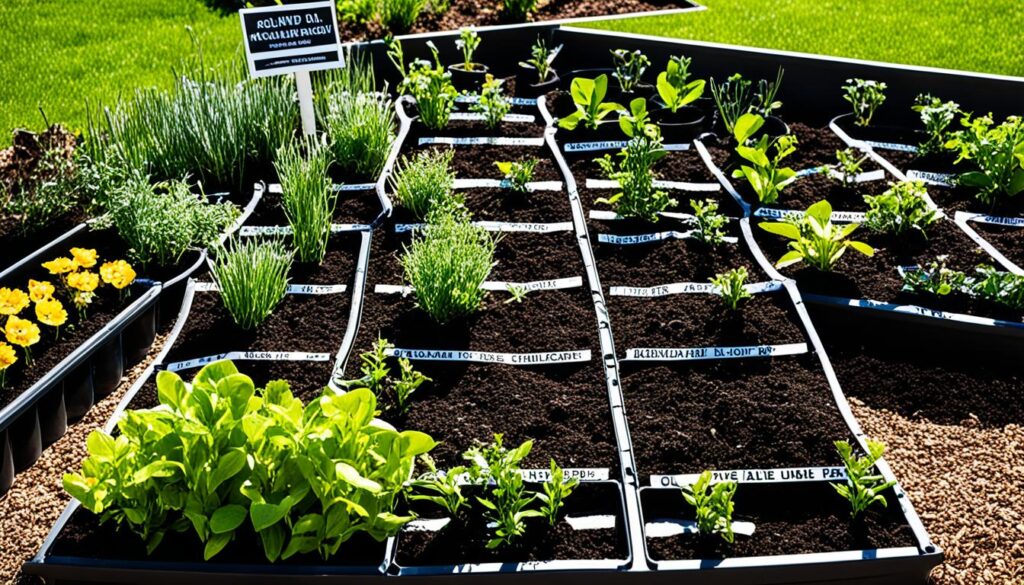
| Gardening Practice | Impact on Growth |
|---|---|
| Intentional planning | 50% increase in flowering plant yields |
| Consistent care and attention | 80% success rate in nurturing seedlings |
| Removing harmful elements | 60% increase in plant health and growth |
| Supportive community/partnership | 25% increase in relationship strength |
“Gardening is a practice that teaches us to cooperate with nature’s processes, rather than trying to force our own will. It’s a lesson that can be applied to all areas of our lives.”
Diversity in the Garden, Diversity in Life
A garden is full of different plants, each needing its own care. Life is the same, filled with people of all kinds. Through gardening, I’ve learned to value diversity. I see that what helps one person might not help another.
Embracing Individual Uniqueness
In my garden, I see how different plants live together well. This teaches me to value everyone’s unique qualities. By embracing uniqueness, we build a community that’s as rich as a garden.
- Like a garden, our lives grow better with different people’s talents and views.
- Accepting each other’s differences helps us learn, understand, and connect deeper.
- Having diversity in our lives boosts creativity, problem-solving, and our relationships.
Tending my garden shows me how diversity and embracing uniqueness apply to life. By valuing everyone’s differences, I create a life that’s as full and strong as my garden.
What Gardening Taught Me About Life
Gardening has turned into a deep metaphor for life’s lessons for me. It shows the patience needed to grow plants and the flexibility to overcome obstacles The garden teaches me valuable lessons that help me grow personally and deal with life’s ups and downs.
Gardening has shown me the value of embracing failure as a chance to grow. Not all seeds make it, and some plants face pests or diseases. But how we handle these setbacks is key. By being resilient and open to learning, I’ve grown more adaptable and accepting of myself.
Another big lesson is the importance of staying rooted when things get tough. Some plants like the feisty periwinkle do well in hard conditions. This taught me to build a strong foundation in life. It helps me keep a healthy spiritual life and a support system to stay grounded during tough times.
“The garden has been a constant teacher, imparting invaluable insights that I’ve been able to apply to my personal growth and the way I navigate life’s ups and downs.”
Gardening also showed me the need for moderation and balance. Over-caring for a plant can harm it. In life, too much of something good can be bad. Finding the right balance between effort and rest helps me live a fulfilling life.
Most importantly, gardening taught me about the beauty of simplicity, humility, and generosity. Plants take only what they need and give back a lot. This made me focus on what’s important, be more thoughtful towards others, and enjoy the small moments that make life meaningful.
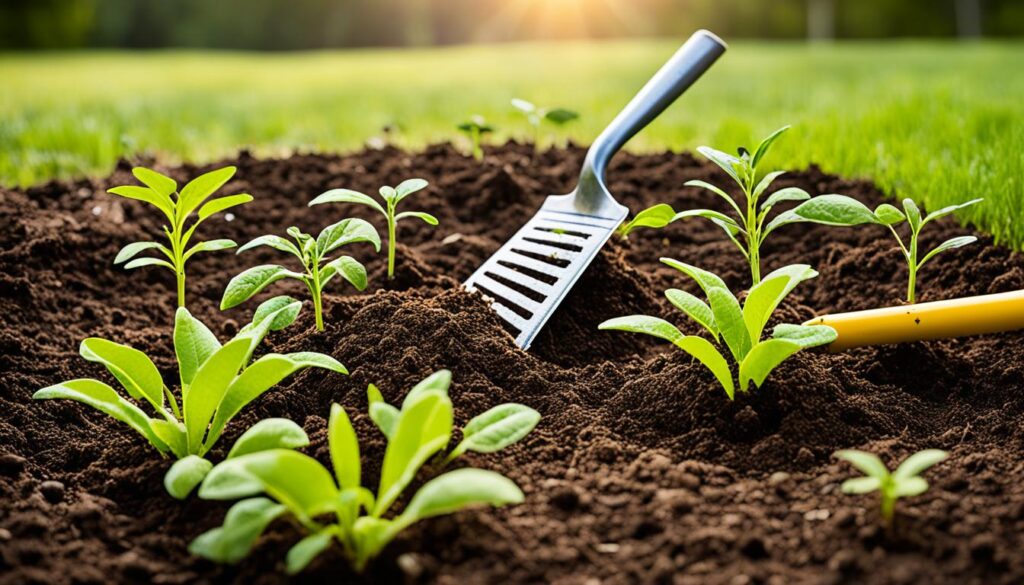
Reflecting on my gardening journey, I see strong parallels with my life as a writer and person. The lessons from the garden have enriched my creativity and shaped my view on a fulfilling life. With each season, I look forward to the challenges and inspiration the garden brings. I’m grateful to grow alongside my plants, evolving and becoming my best self.
The Joy of Harvest: Delayed Gratification
The ultimate reward of gardening is the harvest, when I get to enjoy the fruits of my hard work. This journey has shown me the value of waiting for rewards. It’s about the joy of watching a seed grow into a plant that gives a lot.
Appreciating the Fruits of Labor
Learning to enjoy the harvest has made me value hard work more. It teaches us that the real reward is in the journey, not just the end. This lesson helps in life, not just in gardening.
Gardening teaches us that waiting for the harvest is better than quick wins. This lesson helps me grow in life and work.
“The true essence of gardening lies not just in the final harvest, but in the patient, nurturing process that leads to it. It is a tangible reminder that with dedication and perseverance, we can reap the sweet rewards of our labor.”
By valuing my hard work, I’ve learned to enjoy every step of the way. This mindset makes me feel happy and fulfilled. It teaches me to enjoy each part of the journey.
Gardening shows us that waiting for rewards is a big part of life’s lessons. By being patient and enjoying the process, we find true happiness and purpose. This applies to gardening and life.
Connection with Nature: Grounding and Mindfulness
Gardening has deepened my bond with the natural world, making me feel rooted in the earth’s cycles. By caring for my plants and watching them grow, I’ve learned to be fully present. This has brought me peace, clarity, and a new appreciation for life’s connections.
Studies show that many people, from 64% to 85%, practice mindfulness while gardening. Activities like weeding and planting help them stay in the moment. In fact, 78% see gardening as a way to meditate and boost mindfulness. This connection with nature also improves health, with 92% of psychologists noting better mental health in mindful gardeners.
Gardening isn’t just good for the mind and heart. It can also boost your health. Touching soil and grounding activities can help your body’s antioxidant levels, boost your immune system, and even lower immune disorders. This approach is key for those with chronic illnesses, as it can ease depression and other conditions.
